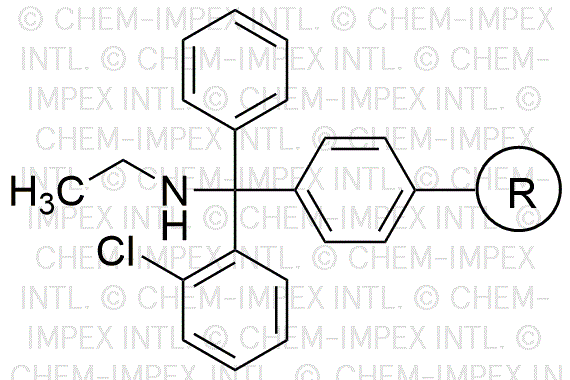Ethylamine 2-chlorotrityl resin (0.3 - 1.2 mmol/g, 100 - 200 mesh) is widely utilized in research focused on:
- Peptide Synthesis: This resin serves as a solid support for the synthesis of peptides, allowing for efficient coupling and deprotection reactions, which is essential in pharmaceutical development.
- Drug Discovery: It is used in combinatorial chemistry to create diverse libraries of compounds, facilitating the identification of new drug candidates.
- Bioconjugation: The resin can be employed to attach biomolecules to surfaces or other molecules, enhancing the development of targeted therapies and diagnostics.
- Analytical Chemistry: It aids in the purification and isolation of compounds, improving the accuracy and efficiency of analytical methods.
- Material Science: The resin is utilized in the development of novel materials with specific chemical properties, contributing to advancements in various industrial applications.
General Information
Properties
Safety and Regulations
Applications
Ethylamine 2-chlorotrityl resin (0.3 - 1.2 mmol/g, 100 - 200 mesh) is widely utilized in research focused on:
- Peptide Synthesis: This resin serves as a solid support for the synthesis of peptides, allowing for efficient coupling and deprotection reactions, which is essential in pharmaceutical development.
- Drug Discovery: It is used in combinatorial chemistry to create diverse libraries of compounds, facilitating the identification of new drug candidates.
- Bioconjugation: The resin can be employed to attach biomolecules to surfaces or other molecules, enhancing the development of targeted therapies and diagnostics.
- Analytical Chemistry: It aids in the purification and isolation of compounds, improving the accuracy and efficiency of analytical methods.
- Material Science: The resin is utilized in the development of novel materials with specific chemical properties, contributing to advancements in various industrial applications.
Documents
Safety Data Sheets (SDS)
The SDS provides comprehensive safety information on handling, storage, and disposal of the product.
Product Specification (PS)
The PS provides a comprehensive breakdown of the product’s properties, including chemical composition, physical state, purity, and storage requirements. It also details acceptable quality ranges and the product's intended applications.
Certificates of Analysis (COA)
Search for Certificates of Analysis (COA) by entering the products Lot Number. Lot and Batch Numbers can be found on a product’s label following the words ‘Lot’ or ‘Batch’.
Numéro de catalogue
Numéro de lot/série
Certificates Of Origin (COO)
This COO confirms the country where the product was manufactured, and also details the materials and components used in it and whether it is derived from natural, synthetic, or other specific sources. This certificate may be required for customs, trade, and regulatory compliance.
Numéro de catalogue
Numéro de lot/série
Safety Data Sheets (SDS)
The SDS provides comprehensive safety information on handling, storage, and disposal of the product.
DownloadProduct Specification (PS)
The PS provides a comprehensive breakdown of the product’s properties, including chemical composition, physical state, purity, and storage requirements. It also details acceptable quality ranges and the product's intended applications.
DownloadCertificates of Analysis (COA)
Search for Certificates of Analysis (COA) by entering the products Lot Number. Lot and Batch Numbers can be found on a product’s label following the words ‘Lot’ or ‘Batch’.
Numéro de catalogue
Numéro de lot/série
Certificates Of Origin (COO)
This COO confirms the country where the product was manufactured, and also details the materials and components used in it and whether it is derived from natural, synthetic, or other specific sources. This certificate may be required for customs, trade, and regulatory compliance.


